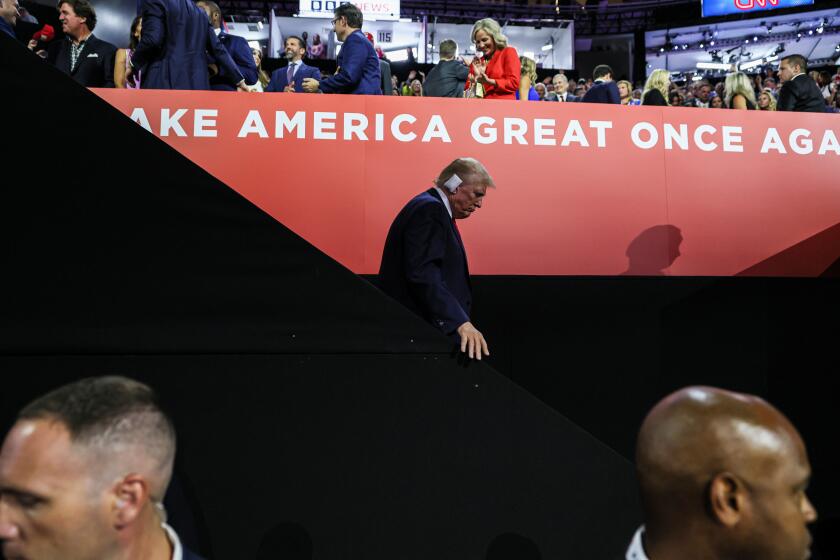Big Ad Agency Is Charged in Kickback Deal : Young & Rubicam Bribed Jamaica Official to Win Account, Indictment Says
A federal grand jury in New Haven, Conn., on Friday indicted the Young & Rubicam advertising agency and five individuals in connection with an alleged scheme in which Y&R; executives are said to have paid $900,000 in bribes to win a Jamaica Tourist Board account in 1981.
Stanley A. Twardy Jr., the U.S. attorney for Connecticut, said the grand jury indicted one high-ranking Young & Rubicam executive and a former executive on charges of conspiracy to violate the Foreign Corrupt Practices Act and racketeering. Another agency executive was charged with perjury, Twardy said.
Also charged with racketeering were Eric Anthony Abrahams, Jamaica’s minister of tourism from 1980 to 1985, and Arnold Foote Jr., an adviser to Abrahams, the U.S. attorney said.
The indictment charges that Young & Rubicam agreed to “kick back” a third of its 15% commission on the account to Abrahams and Foote in exchange for their help in getting the account. Abrahams and Foote were accused of setting up a “sham” advertising agency, Ad Ventures Ltd., in the Cayman Islands to conceal the kickback scheme.
Successful Campaign
The alleged plot, according to the indictment, also involved concealing funds in the bank account of the Connecticut author of “The Happy Hooker,” who eventually was nabbed in a tax evasion scheme. The Internal Revenue Service investigation of the fraudulent tax shelters tipped federal investigations off to alleged irregularities surrounding the advertising account, Twardy said.
Ironically, the charges involved one of New York-based Young & Rubicam’s most successful but financially least important accounts. The “Come Back to Jamaica” broadcast and print campaign--featuring tourists relaxing on pristine beaches and at posh island resorts--has won the agency awards and is credited with more than doubling Jamaican tourism during the last eight years. However, Young & Rubicam said the account--valued by trade journals at $10 million in 1989--amounts to “less than one-thousandth of Young & Rubicam’s worldwide billing.” Twardy said the account generated $29 million in billings over the eight-year period.
The company, the world’s largest privately held advertising agency, said the charges against the corporation and its executives were “based on speculation and innuendo and are without substance and merit.” In a lengthy statement, the agency said it found no illegal acts in an internal investigation conducted after it learned of the federal probe in 1986. It said it has cooperated fully with the government’s probe and “intends to defend itself, its employees and its reputation vigorously.”
Executive Vice President Arthur R. Klein of Chappaqua, N.Y., was charged with one count of conspiracy to violate the corrupt practices act and one count of violating the Racketeering Influenced and Corrupt Organizations statutes. Twardy said Klein faces a jail term up to 25 years and a $500,000 fine.
Former Young & Rubicam Vice President Thomas Spangenberg of New York was charged with one count of conspiracy and one RICO count. He also faces up to 25 years in jail and a $500,000 fine.
Steven M. McKenna of New York, currently chief financial officer of Young & Rubicam’s Wunderman Worldwide subsidiary and a former account executive for the Jamaican campaign, was charged with lying to the grand jury during the investigation. He faces a possible five-year jail term and a $250,000 fine.
Began in 1980
Young & Rubicam could be fined $1 million if convicted on the charges. The government is also seeking forfeiture of the agency’s $3.5-million gross profit on the account.
Twardy said the scheme began in 1980 shortly after former Jamaica Prime Minister Edward Seaga defeated Michael Manley, who ousted Seaga this year. According to the 43-page indictment, Abrahams told advertising executives, who informed him that there were no kickbacks under Manley, that “things may be different in the new administration.” Foote allegedly was told to find an American-based ad agency for the tourism board.
The indictment stated that Abrahams and Foote traveled to the United States several times in “connection with the kickback scheme.” They allegedly met at the Westport, Conn., home of author Robert L. (Robin) Moore with Young & Rubicam officials, including Klein and Spangenberg. Moore, also author of “The French Connection,” pleaded guilty in 1986 to charges of conspiracy resulting from the tax investigation.
Young & Rubicam said it hired Foote’s Ad Ventures to provide account services in Jamaica. But it had no reason to believe that he was a public official within the meaning of the federal corrupt practices law. The agency said it knows of no evidence that Foote ever paid money to Abrahams. “Mr. Foote and Mr. Abrahams both steadfastly deny there were such payments,” Young & Rubicam said. It said it no longer does business with Ad Ventures.
Several U.S. businesses have been charged with violating the 1977 Foreign Corrupt Practices Act, but this is apparently the first time such charges have been brought in the advertising industry. Goodyear International Corp. paid a $250,000 fine in May after pleading guilty to paying bribes to get tire business with the government of Iraq, and the Justice Department is looking into whether Northrop made illegal payments in South Korea in violation of the act.
More to Read
Start your day right
Sign up for Essential California for news, features and recommendations from the L.A. Times and beyond in your inbox six days a week.
You may occasionally receive promotional content from the Los Angeles Times.






